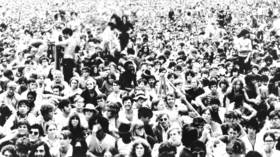Woodstock festival co-creator dies at 77


Michael Lang, co-creator and organizer of the era-defining 1969 festival Woodstock Music and Art Fair, and the somewhat less iconic 1994 and 1999 attempted repeats that followed, has died of non-Hodgkin’s lymphoma at age 77.
The concert promoter died on Saturday of a rare form of the cancer at Sloan Kettering hospital in New York City, according to family spokesman Michael Pagnotta. He is survived by his wife, Tamara, their two sons and three daughters.
Lang had most recently come to public attention attached to questions over whether or not he would attempt to stage a 50th-anniversary edition of Woodstock in 2019. Plans were ultimately spiked when major financial backers pulled their support at the last minute, triggering lawsuits as the promoters failed to secure permits amid a last-minute venue change.
While all three incarnations of Woodstock had their share of planning disasters, the 1969 event is regarded as one of the defining moments of the hippie era, remembered fondly in the US as a more innocent time even though the festival’s promoters were admittedly packaging and selling a lifestyle to the young music fans, just as later subcultures’ string-pullers did.
The 1994 Woodstock was perhaps best known for the sea of mud – much of which was actually raw sewage – that the grounds turned into when facilities ceased functioning, and the 1999 version likely put an end to the use of the Woodstock name for good as crowds rioted and sexual assaults were said to have been rampant.
However, Lang remained a believer in the transformative power of music until the end, declaring that Woodstock was not “just entertainment; it was more about the social issues.” The festival “offered an environment for people to express their better selves, if you will.” While admitting the original 1969 festival was “a commercial venture meant to make money for our partners,” he credited it with inspiring later movements such as Earth Day and “women’s rights,” and even the inauguration of Barack Obama, which he bizarrely called “Washington’s Woodstock.”